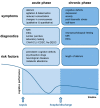Sepsis-Associated Encephalopathy: From Delirium to Dementia?
- PMID: 32150970
- PMCID: PMC7141293
- DOI: 10.3390/jcm9030703
Sepsis-Associated Encephalopathy: From Delirium to Dementia?
Abstract
Sepsis is a major cause of death in intensive care units worldwide. The acute phase of sepsis is often accompanied by sepsis-associated encephalopathy, which is highly associated with increased mortality. Moreover, in the chronic phase, more than 50% of surviving patients suffer from severe and long-term cognitive deficits compromising their daily quality of life and placing an immense burden on primary caregivers. Due to a growing number of sepsis survivors, these long-lasting deficits are increasingly relevant. Despite the high incidence and clinical relevance, the pathomechanisms of acute and chronic stages in sepsis-associated encephalopathy are only incompletely understood, and no specific therapeutic options are yet available. Here, we review the emergence of sepsis-associated encephalopathy from initial clinical presentation to long-term cognitive impairment in sepsis survivors and summarize pathomechanisms potentially contributing to the development of sepsis-associated encephalopathy.
Keywords: SAE; brain dysfunction; cognitive deficits; delirium; dementia; encephalopathy; long-term sequelae; pathophysiology; sepsis.
Conflict of interest statement
The authors declare no conflicts of interest.
Figures
References
-
- Fleischmann C., Scherag A., Adhikari N.K., Hartog C.S., Tsaganos T., Schlattmann P., Angus D.C., Reinhart K., International Forum of Acute Care Trialists Assessment of Global Incidence and Mortality of Hospital-treated Sepsis. Current Estimates and Limitations. Am. J. Respir. Crit. Care Med. 2016;193:259–272. doi: 10.1164/rccm.201504-0781OC. - DOI - PubMed
Publication types
Grants and funding
LinkOut - more resources
Full Text Sources



